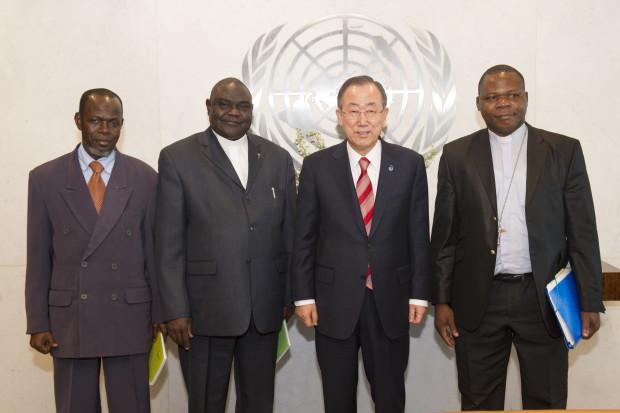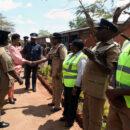Intervention in the CAR: less talk, more action – By Hanna Ucko Neill

UN Secretary-General Ban Ki-moon meets with religious leaders of the Central African Republic (UN photo library).
As the twentieth anniversary of the Rwandan genocide approaches, the international community once again faces questions about the definition of genocide, how and when to intervene to protect civilians and at what cost. The enduring images of human cruelty and brutality that the genocide produced illustrate how hate speech and ethnic violence, combined with international inaction, can spiral out of control. In the space of 100 days, 800,000 people were killed, 200,000 were raped, with two million people leaving the country.
Both during and after the genocide, major powers were criticised for their inaction. As well as failing to strengthen the size and mandate of the United Nations peacekeeping force’s size and mandate, it took weeks for major powers to decide whether the massacres should be classed as genocide. In the meantime, the killings spread far beyond the capital to the centre and south of the country.
After the genocide, leaders of national governments and international institutions expressed their regret at their responses to the crisis in Rwanda. In 1998, US President Bill Clinton apologised for not acting and in 2004, UN Secretary-General Kofi Annan said he personally could have done more to stop the genocide. In 2005, UN member states unanimously agreed that they had a collective ‘responsibility to protect’ those threatened by genocide and other mass atrocity crimes.
Yet, here we are again. Since December 2013, the situation in the CAR has spiralled out of control. Today, vigilante Christian militias, known as anti-balaka, have been carrying out daily attacks on the Muslim minority. The Muslim minority, about 15% of the country, has been targeted by Christians who suffered when predominately Muslim Seleka rebels who overthrew the government in March 2013. According to Human Rights Watch, Seleka rebels committed mass atrocities during and after the coup. Despite the disbanding of the rebel group in September 2013 by its leader and former CAR president Michel Djotodia, executions, rapes and looting continued. Thousands of people have been killed by the anti-balaka, 650,000 have been displaced, over 290,000 have fled to neighbouring countries, and 2.2 million – nearly half of the population of the CAR – need humanitarian aid.
Navi Pillay, the UN High Commissioner for Human Rights, recently described the situation in the CAR as “dire” with the inter-communal violence remaining at a “terrifying level”. The UN’s refugee agency has described the situation as “humanitarian catastrophe of unspeakable proportions. Massive ethno-religious cleansing is continuing”. Levels of hate speech and propaganda are high and comparisons have been made between the press in CAR and Radio Mille Collines, the primary radio station fanning the flames of genocide during the Rwandan genocide. Children have been decapitated, victims have been mutilated and burnt, and there are cases reported of killers eating the flesh of their victims. Pillay stressed that although CAR has received international attention, it is far from commensurate with the needs.
It is clear that the current 6,000 African-led International Support Mission to the Central African Republic (MISCA) peacekeepers and the 2,000 French troops of Operation Sangaris cannot on their own protect the civilian population in the country. The UN Secretary-General Ban Ki-moon has pushed for the deployment of peacekeepers since November 2013, when he told the Security Council that a UN force of up to 9,000 troops and 1,700 policemen would be needed. Since then, he has increased the request to 12,000 and called on the international community to deploy within weeks. However, deploying a Security Council-mandated peacekeeping force will take at least six months and is not expected until September 2014 at the earliest. As a stop-gap measure, on 10th February, the EU committed itself to the rapid deployment of 1,000 soldiers, in addition to supplies and equipment. Despite repeated requests from high-level officials, including EU foreign policy Chief Baroness Catherine Ashton, the troops have not materialised.
Some of the hesitation is linked to the cost of funding a peacekeeping mission. The cost of a 10,000-20,000 peacekeeping force can, based on precedent, rise to $1 billion a year. However, it is possible that that economic, humanitarian and development impact of international inaction would cost more. Amid warnings from the UN that the proliferation of hate speech and the collapse of law and order are likely precursors to grave human-right abuses, including genocide, it remains to be seen whether the international community has indeed learned from its mistakes in Rwanda. Time will tell if the UN and its most powerful member states can move away from declaring regret over actions not taken and give meaning and sincerity to the “˜responsibility to protect’ that is so often espoused.
Hanna Ucko Neill is Global Conflicts Analyst at the International Institute for Strategic Studies (IISS).
Email: [email protected]
Twitter: @HannaUckoNeill






